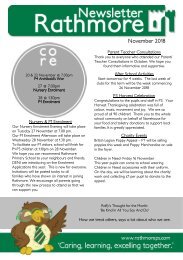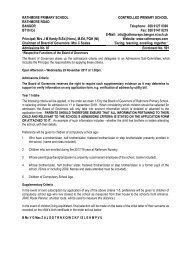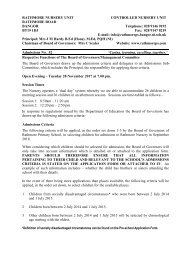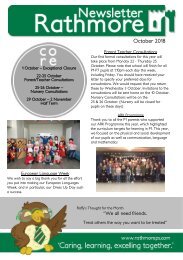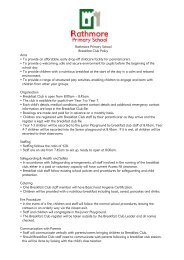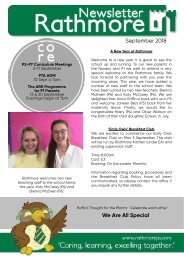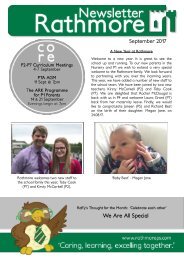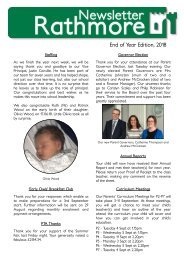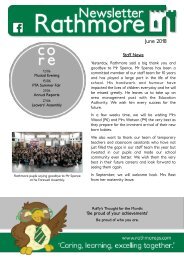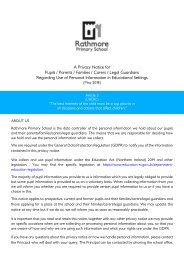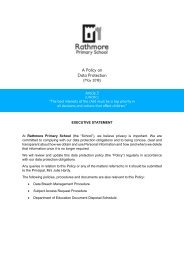Child Protection
You also want an ePaper? Increase the reach of your titles
YUMPU automatically turns print PDFs into web optimized ePapers that Google loves.
Policy and Procedures on <strong>Child</strong> <strong>Protection</strong><br />
(September 2017)<br />
Article 19<br />
Governments should ensure that children are properly cared for,<br />
and protect them from violence, abuse and neglect by their parents,<br />
or anyone else who looks after them.’<br />
Rathmore Primary School has a primary responsibility for the care, welfare and<br />
safety of our pupils. We will carry out this duty through our pastoral care policy,<br />
which aims to provide a caring, supportive and safe environment, valuing<br />
individuals for their unique talents and abilities, in which all our young people can<br />
learn and develop to their full potential.<br />
This policy is also based on the United Nations Convention on the Rights of the<br />
<strong>Child</strong> with particular reference to Article 19 which states that children should be<br />
safe from harm.<br />
One way in which we seek to protect our pupils is by helping them learn about<br />
the risks of possible abuse, helping them to recognise unwelcome behaviour in<br />
others and acquire the confidence and skills they need to keep themselves safe.<br />
All our staff and volunteers have been subject to appropriate background checks.<br />
The staff of our school have also adopted a Code of Practice for our behaviour<br />
towards pupils. All staff are trained every two years in child protection<br />
procedures, as are new staff as they arrive.<br />
The purpose of the following procedures on <strong>Child</strong> <strong>Protection</strong> is to protect our<br />
pupils by ensuring that everyone who works in our school- teachers, non-teaching<br />
staff and volunteers- has clear guidance on the action which is required where<br />
abuse or neglect of a child is suspected. The overriding concern of all caring adults<br />
must be the care, welfare and safety of the child, and the welfare of each child is<br />
our paramount consideration. The problem of child abuse will not be ignored by<br />
anyone who works in our school. We know that some forms of child abuse are<br />
also a criminal offence.<br />
1
What is child abuse?<br />
We use the following definition:<br />
Neglect - the persistent or significant neglect of a child, or the failure to protect a<br />
child from exposure to any kind of danger, including cold or starvation, or<br />
persistent failure to carry out important aspects of care, resulting in the significant<br />
impairment of the child’s health or development.<br />
Physical - physical injury to a child, whether deliberately inflicted or knowingly not<br />
prevented.<br />
Sexual - the sexual exploitation of a child or young person for an adult’s or<br />
another young person’s own sexual gratification: the involvement of children or<br />
young people in sexual activities of any kind which they do not understand, to<br />
which they are unable to give informed consent or that violate normal family<br />
roles.<br />
Emotional - persistent or significant emotional ill-treatment or rejection, resulting<br />
in severe adverse effects on the emotional, physical and/ or behavioural<br />
development of a child.<br />
Exploitation is the intentional ill-treatment, manipulation or abuse of power and<br />
control over a child or young person; to take selfish or unfair advantage of a child<br />
or young person or situation, for personal gain.<br />
Bullying<br />
Bullying is a highly distressing and damaging form of abuse and is not tolerated in<br />
our school. All the staff are vigilant at all times to the possibility of bullying<br />
occurring, and will take immediate steps to stop it happening, to protect and<br />
reassure the victim and to discipline the bully. Parents of those children involved<br />
will be contacted.<br />
A complaint by a parent that their child is, or may be, being bullied will be fully<br />
investigated first by the class teacher and then if required, by the designated<br />
teacher for child protection, and team action will be taken to protect the victim. A<br />
parent making a complaint about bullying will have a response within one week<br />
of making the complaint, indicating the investigation which has been carried out<br />
and the action being taken.<br />
The sanctions taken against a pupil who bullies will depend on the seriousness of<br />
the case. His/ her behaviour will be carefully monitored until staff are satisfied that<br />
the problem has stopped.<br />
For further information refer to Anti-Bullying Policy<br />
2
Procedures for Reporting Suspected (or Disclosed) <strong>Child</strong> Abuse<br />
The designated teacher for child protection is Mrs McGimpsey. The deputy<br />
designated teacher is Mr Conville.<br />
If a child makes a disclosure to a teacher or other member of staff which gives<br />
rise to concerns about possible abuse, or if a member of staff has concerns about<br />
a child, the member of staff will act promptly.<br />
He/ she will not investigate- this is a matter for the Social Services- but will report<br />
these concerns immediately to the designated teacher, discuss the matter with<br />
her, and make full notes.<br />
In the event of an allegation of child abuse, the member of staff will:<br />
Receive:<br />
Listen to the child and accept what is said and record statements.<br />
Reassure<br />
Reassure the child, without promising confidentiality.<br />
React:<br />
Explain that information must be passed on to the designated teacher.<br />
Record:<br />
Make notes as soon as possible.<br />
The designated teacher will discuss the matter with the Principal as a matter of<br />
urgency to plan a course of action, and ensure that a written record is made.<br />
The Principal, in consultation with the designated teacher, will decide whether, in<br />
the best interests of the child, the matter needs to be referred to Social Services. If<br />
there are concerns that the child may be at risk, the school is obliged to make a<br />
referral. Unless there are concerns that a parent may be the possible abuser, the<br />
parents will be informed.<br />
The Principal may seek clarification or advice and consult with the EA’s<br />
Designated Officer or the Senior Social Worker before a referral is made. No<br />
decision to refer a case to Social Services will be made without the fullest<br />
consideration and on appropriate advice. The safety of the child is our first<br />
priority.<br />
Where there are concerns about possible abuse, the Principal will inform:<br />
<br />
<br />
The Social Services<br />
The EA’s Designated Officer for <strong>Child</strong> <strong>Protection</strong><br />
3
If a complaint about possible child abuse is made against a member of staff, the<br />
Principal (or the designated teacher if she is not available) will be informed<br />
immediately. The above procedures will apply (unless the complaint is about the<br />
designated teacher). Where the matter is referred to Social Services, the member<br />
of staff will be removed from duties involving direct contact with pupils, and may<br />
be suspended from duty as a precautionary measure pending investigation by<br />
Social Services. The Chairman of the Board of Governors will be informed<br />
immediately.<br />
If a complaint is made against the Principal, the designated teacher (or her<br />
deputy) must be informed immediately. He /she will inform the Chairman of the<br />
Board of Governors and together they will ensure that the necessary action is<br />
taken.<br />
If any member of staff feels unsure about what to do if he/she has concerns about<br />
a child, or unsure about being able to recognise the signs or symptoms of possible<br />
abuse, he /she should speak to the designated teacher.<br />
It should be noted that information given to members of staff about possible child<br />
abuse cannot be held ‘in confidence’. In the interests of the child, staff may need to<br />
share this information with other professionals. However, only those who need to<br />
know will be told.<br />
This policy is kept under review by the Board of Governors and should be read in<br />
conjunction with a range of other school policies including:<br />
Anti-bullying;<br />
Acceptable Use of the Internet;<br />
Health and Safety;<br />
Intimate Care; and<br />
Code of Conduct for Staff.<br />
4




